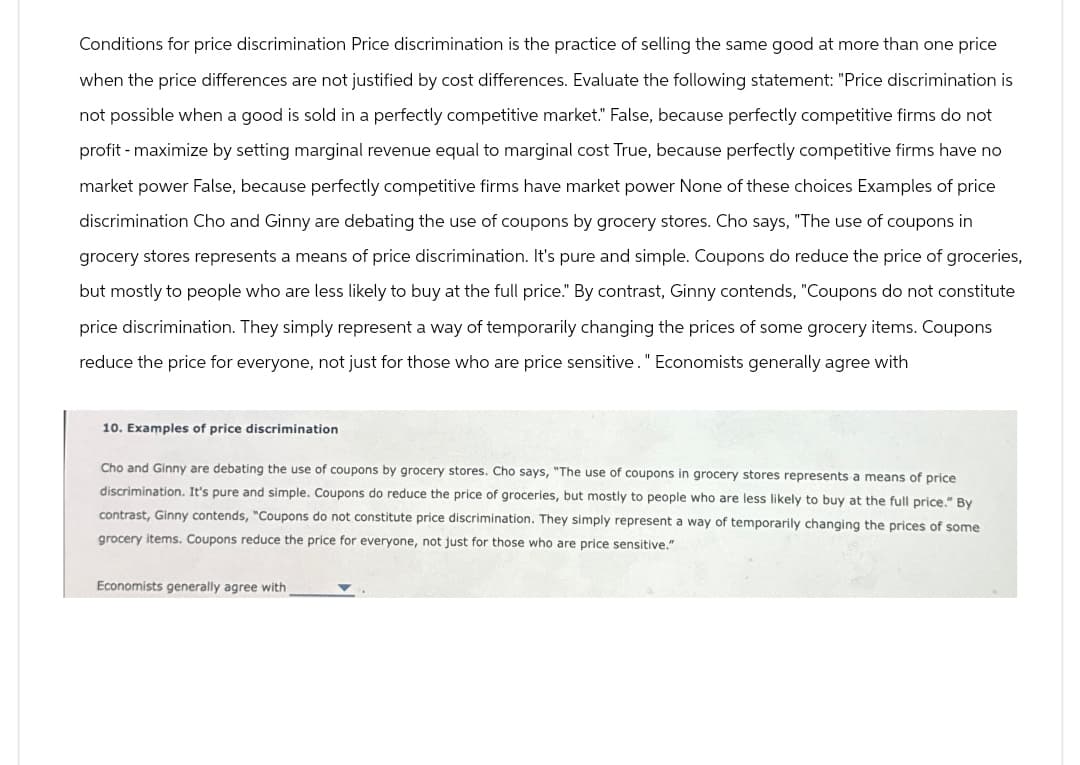Cho and Ginny are debating the use of coupons by grocery stores. Cho says, "The use of coupons in grocery stores represents a means of price discrimination. It's pure and simple. Coupons do reduce the price of groceries, but mostly to people who are less likely to buy at the full price." By contrast, Ginny contends, "Coupons do not constitute price discrimination. They simply represent a way of temporarily changing the prices of some grocery items. Coupons reduce the price for everyone, not just for those who are price sensitive." Economists generally agree with
Cho and Ginny are debating the use of coupons by grocery stores. Cho says, "The use of coupons in grocery stores represents a means of price discrimination. It's pure and simple. Coupons do reduce the price of groceries, but mostly to people who are less likely to buy at the full price." By contrast, Ginny contends, "Coupons do not constitute price discrimination. They simply represent a way of temporarily changing the prices of some grocery items. Coupons reduce the price for everyone, not just for those who are price sensitive." Economists generally agree with
Chapter14: Monopoly
Section: Chapter Questions
Problem 14.3P
Related questions
Question

Transcribed Image Text:Conditions for price discrimination Price discrimination is the practice of selling the same good at more than one price
when the price differences are not justified by cost differences. Evaluate the following statement: "Price discrimination is
not possible when a good is sold in a perfectly competitive market." False, because perfectly competitive firms do not
profit - maximize by setting marginal revenue equal to marginal cost True, because perfectly competitive firms have no
market power False, because perfectly competitive firms have market power None of these choices Examples of price
discrimination Cho and Ginny are debating the use of coupons by grocery stores. Cho says, "The use of coupons in
grocery stores represents a means of price discrimination. It's pure and simple. Coupons do reduce the price of groceries,
but mostly to people who are less likely to buy at the full price." By contrast, Ginny contends, "Coupons do not constitute
price discrimination. They simply represent a way of temporarily changing the prices of some grocery items. Coupons
reduce the price for everyone, not just for those who are price sensitive." Economists generally agree with
10. Examples of price discrimination
Cho and Ginny are debating the use of coupons by grocery stores. Cho says, "The use of coupons in grocery stores represents a means of price
discrimination. It's pure and simple. Coupons do reduce the price of groceries, but mostly to people who are less likely to buy at the full price." By
contrast, Ginny contends, "Coupons do not constitute price discrimination. They simply represent a way of temporarily changing the prices of some
grocery items. Coupons reduce the price for everyone, not just for those who are price sensitive."
Economists generally agree with_
Expert Solution
This question has been solved!
Explore an expertly crafted, step-by-step solution for a thorough understanding of key concepts.
Step by step
Solved in 3 steps

Knowledge Booster
Learn more about
Need a deep-dive on the concept behind this application? Look no further. Learn more about this topic, economics and related others by exploring similar questions and additional content below.Recommended textbooks for you



Principles of Economics 2e
Economics
ISBN:
9781947172364
Author:
Steven A. Greenlaw; David Shapiro
Publisher:
OpenStax



Principles of Economics 2e
Economics
ISBN:
9781947172364
Author:
Steven A. Greenlaw; David Shapiro
Publisher:
OpenStax

Economics: Private and Public Choice (MindTap Cou…
Economics
ISBN:
9781305506725
Author:
James D. Gwartney, Richard L. Stroup, Russell S. Sobel, David A. Macpherson
Publisher:
Cengage Learning

Microeconomics: Private and Public Choice (MindTa…
Economics
ISBN:
9781305506893
Author:
James D. Gwartney, Richard L. Stroup, Russell S. Sobel, David A. Macpherson
Publisher:
Cengage Learning